Unit 4 Never too old to learn Reading 课件(共34张PPT)-2025-2026学年译林版(2020)选择性必修第四册
文档属性
| 名称 | Unit 4 Never too old to learn Reading 课件(共34张PPT)-2025-2026学年译林版(2020)选择性必修第四册 | 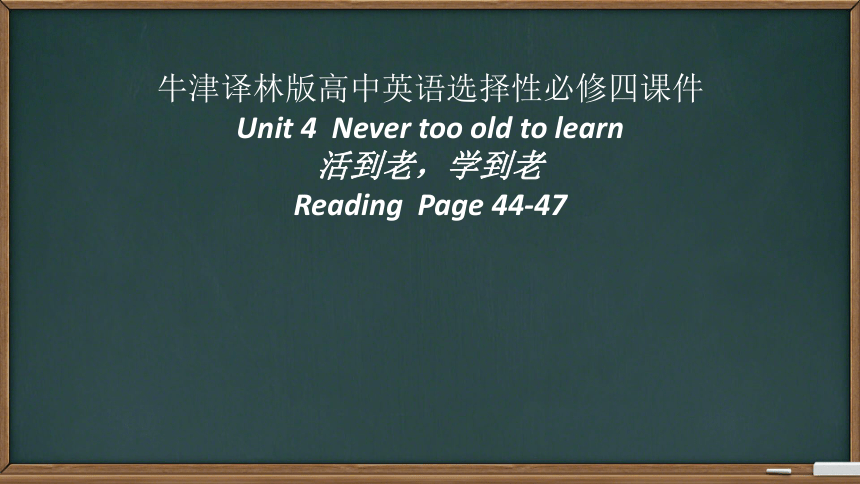 | |
| 格式 | pptx | ||
| 文件大小 | 323.1KB | ||
| 资源类型 | 教案 | ||
| 版本资源 | 牛津译林版(2019) | ||
| 科目 | 英语 | ||
| 更新时间 | 2025-07-18 08:07:26 | ||
图片预览

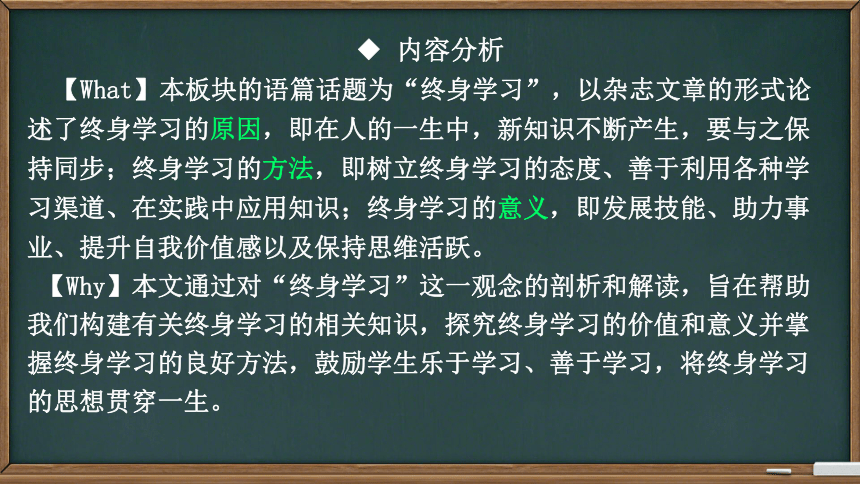
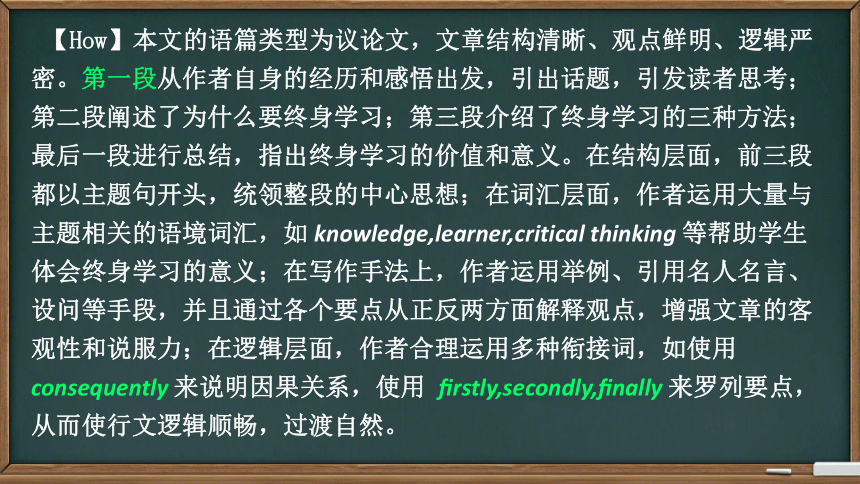
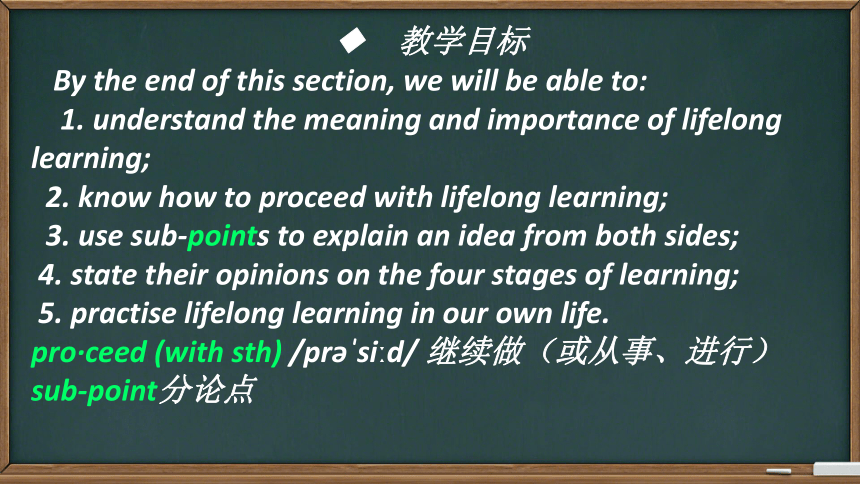
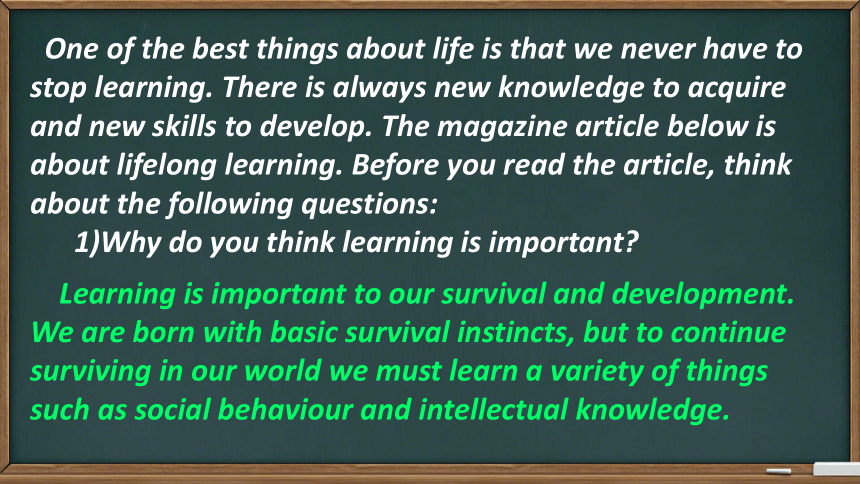
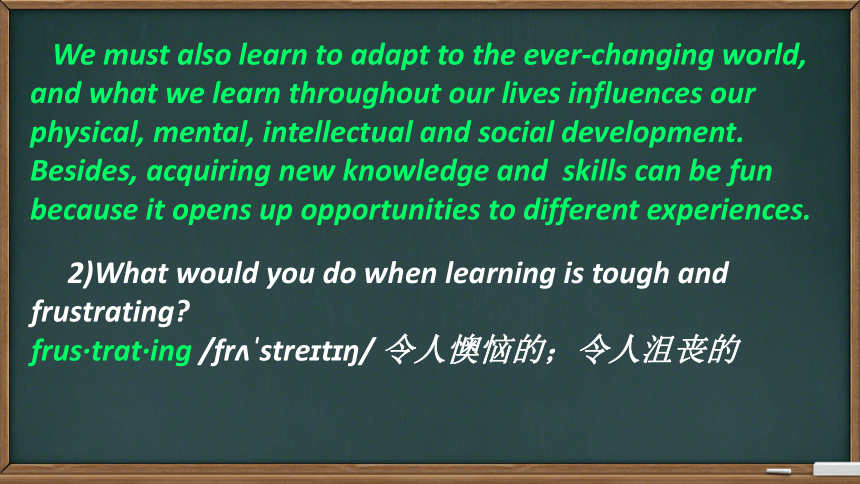
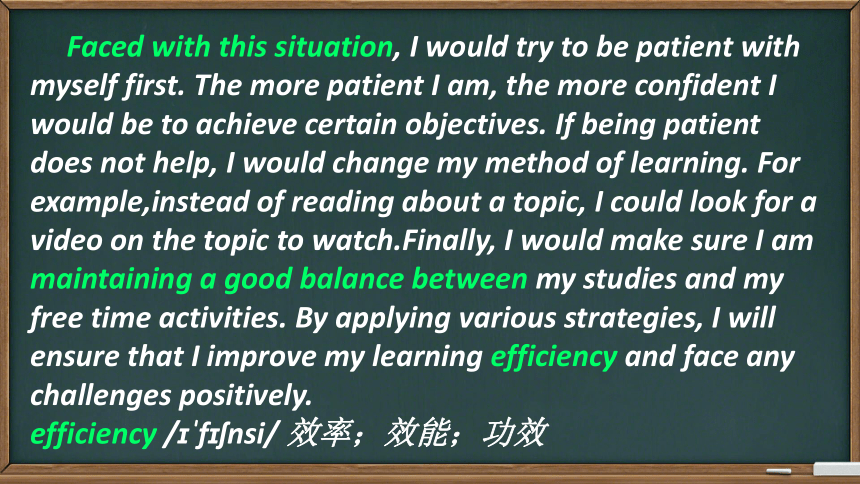
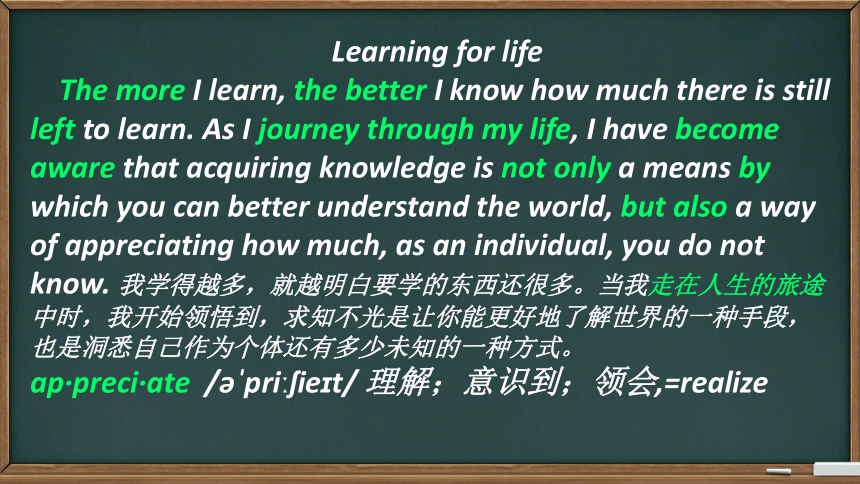
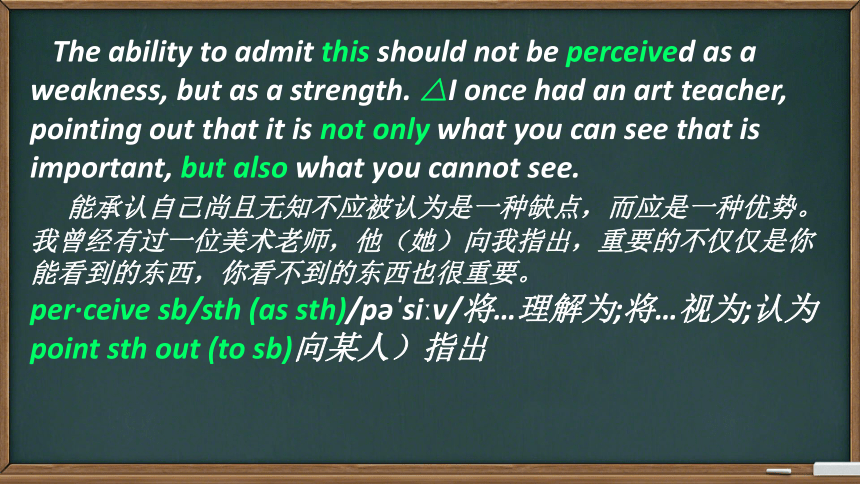

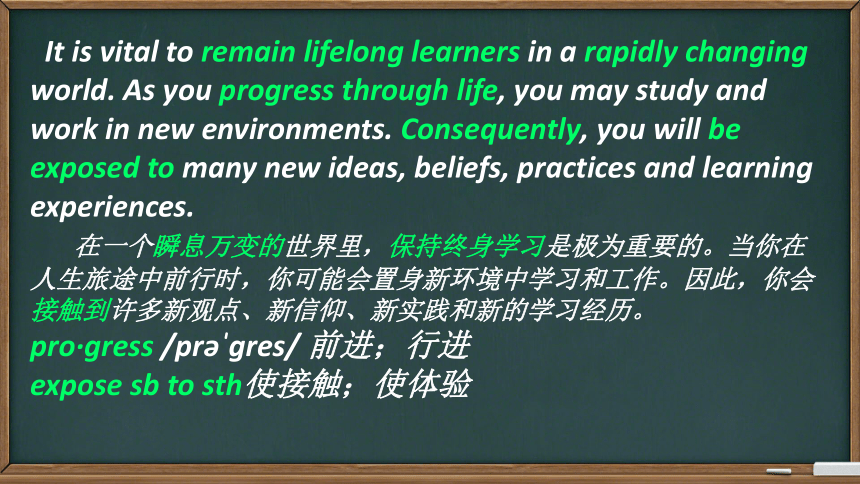
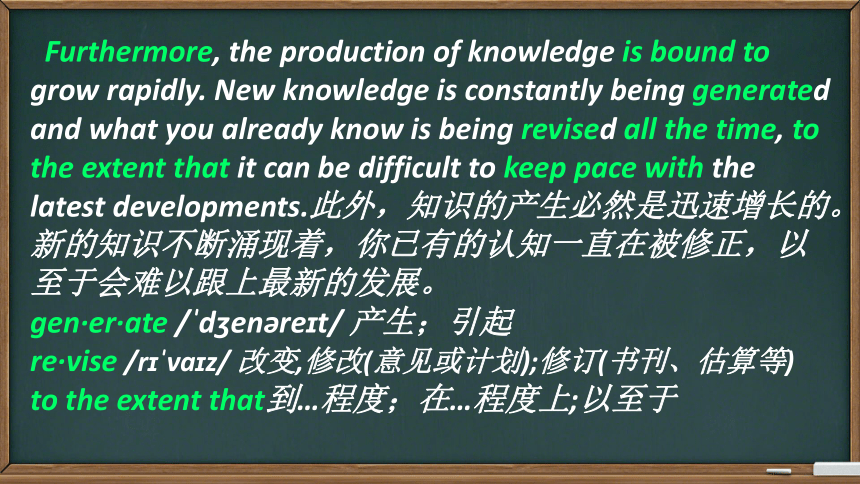
文档简介
(共34张PPT)
牛津译林版高中英语选择性必修四课件
Unit 4 Never too old to learn
活到老,学到老
Reading Page 44-47
◆ 内容分析
【What】本板块的语篇话题为“终身学习”,以杂志文章的形式论述了终身学习的原因,即在人的一生中,新知识不断产生,要与之保持同步;终身学习的方法,即树立终身学习的态度、善于利用各种学习渠道、在实践中应用知识;终身学习的意义,即发展技能、助力事业、提升自我价值感以及保持思维活跃。
【Why】本文通过对“终身学习”这一观念的剖析和解读,旨在帮助我们构建有关终身学习的相关知识,探究终身学习的价值和意义并掌握终身学习的良好方法,鼓励学生乐于学习、善于学习,将终身学习的思想贯穿一生。
【How】本文的语篇类型为议论文,文章结构清晰、观点鲜明、逻辑严密。第一段从作者自身的经历和感悟出发,引出话题,引发读者思考;第二段阐述了为什么要终身学习;第三段介绍了终身学习的三种方法;最后一段进行总结,指出终身学习的价值和意义。在结构层面,前三段都以主题句开头,统领整段的中心思想;在词汇层面,作者运用大量与主题相关的语境词汇,如 knowledge,learner,critical thinking 等帮助学生体会终身学习的意义;在写作手法上,作者运用举例、引用名人名言、设问等手段,并且通过各个要点从正反两方面解释观点,增强文章的客观性和说服力;在逻辑层面,作者合理运用多种衔接词,如使用 consequently 来说明因果关系,使用 rstly,secondly, nally 来罗列要点,从而使行文逻辑顺畅,过渡自然。
◆ 教学目标
By the end of this section, we will be able to:
1. understand the meaning and importance of lifelong learning;
2. know how to proceed with lifelong learning;
3. use sub-points to explain an idea from both sides;
4. state their opinions on the four stages of learning;
5. practise lifelong learning in our own life.
pro·ceed (with sth) /pr si d/ 继续做(或从事、进行)
sub-point分论点
One of the best things about life is that we never have to stop learning. There is always new knowledge to acquire and new skills to develop. The magazine article below is about lifelong learning. Before you read the article, think about the following questions:
1)Why do you think learning is important
Learning is important to our survival and development. We are born with basic survival instincts, but to continue surviving in our world we must learn a variety of things such as social behaviour and intellectual knowledge.
2)What would you do when learning is tough and frustrating
frus·trat·ing /fr stre t / 令人懊恼的;令人沮丧的
We must also learn to adapt to the ever-changing world, and what we learn throughout our lives influences our physical, mental, intellectual and social development.
Besides, acquiring new knowledge and skills can be fun because it opens up opportunities to different experiences.
Faced with this situation, I would try to be patient with myself first. The more patient I am, the more confident I would be to achieve certain objectives. If being patient does not help, I would change my method of learning. For example,instead of reading about a topic, I could look for a video on the topic to watch.Finally, I would make sure I am maintaining a good balance between my studies and my free time activities. By applying various strategies, I will ensure that I improve my learning efficiency and face any challenges positively.
efficiency / f nsi/ 效率;效能;功效
Learning for life
The more I learn, the better I know how much there is still left to learn. As I journey through my life, I have become aware that acquiring knowledge is not only a means by which you can better understand the world, but also a way of appreciating how much, as an individual, you do not know. 我学得越多,就越明白要学的东西还很多。当我走在人生的旅途中时,我开始领悟到,求知不光是让你能更好地了解世界的一种手段,也是洞悉自己作为个体还有多少未知的一种方式。
ap·preci·ate / pri ie t/ 理解;意识到;领会,=realize
The ability to admit this should not be perceived as a weakness, but as a strength. △I once had an art teacher, pointing out that it is not only what you can see that is important, but also what you cannot see.
能承认自己尚且无知不应被认为是一种缺点,而应是一种优势。我曾经有过一位美术老师,他(她)向我指出,重要的不仅仅是你能看到的东西,你看不到的东西也很重要。
per·ceive sb/sth (as sth)/p si v/将…理解为;将…视为;认为
point sth out (to sb)向某人)指出
When I drew a still life, it was impressed upon me that the blank spaces between the objects were just as vital to the success of the composition as the actual objects themselves.
Also, as the great educator Confucius stated, “When you know a thing, to recognize that you know it; and when you do not know a thing, to recognize that you do not know it—that is wisdom.”当我在画静物时,我意识到成功的构图中,物体间的留白和实际的物体本身一样关键。并且,正如伟大的教育家孔子所言:“知之为知之,不知为不知,是知也。”
impress sth on/upon sb使意识到(重要性或严重性等)
It is vital to remain lifelong learners in a rapidly changing world. As you progress through life, you may study and work in new environments. Consequently, you will be exposed to many new ideas, beliefs, practices and learning experiences.
在一个瞬息万变的世界里,保持终身学习是极为重要的。当你在人生旅途中前行时,你可能会置身新环境中学习和工作。因此,你会接触到许多新观点、新信仰、新实践和新的学习经历。
pro·gress /pr ɡres/ 前进;行进
expose sb to sth使接触;使体验
Furthermore, the production of knowledge is bound to grow rapidly. New knowledge is constantly being generated and what you already know is being revised all the time, to the extent that it can be difficult to keep pace with the latest developments.此外,知识的产生必然是迅速增长的。新的知识不断涌现着,你已有的认知一直在被修正,以至于会难以跟上最新的发展。
gen·er·ate / d en re t/ 产生;引起
re·vise /r va z/ 改变,修改(意见或计划);修订(书刊、估算等)
to the extent that到…程度;在…程度上;以至于
Indeed, you may one day do jobs that do not yet exist, use
technologies that are not yet developed and resolve problems that are not yet problems! This is not to suggest that there is no need for you to study in school but to acknowledge that refreshing your knowledge through lifelong learning is both essential and beneficial.
实际上,有朝一日你也许会从事目前还不存在的职业,使用目前尚未开发的技术,解决当下还不是问题的问题!这并不是说学校教育对你来说没有必要,而是承认通过终身学习来更新你的知识是必不可少且十分有益的。
So, how can you proceed Firstly, lifelong learning is an attitude. Lifelong learners are those who have an open mind. Be objective and make yourself open to new
knowledge and ideas. Do not criticize them or reject them simply because they differ from what you know or believe. 那么,该如何做到呢?首先,终身学习是一种态度。终身学习者是那些有着开放心态的人。客观看待事物,让自己接纳新知识和新理念。不要仅仅因为它们与自己的认知或信念不同,就加以批评或拒斥。
have/keep an open mind (about/on sth)愿意聆听(或接受)意见;(对…)不怀成见;思想开明
open to sth(人 ) 思想开明的;不固执己见的
At the same time, you need to develop critical thinking skills so that you do not blindly accept new ideas. Instead, you should inquire further to assess the truth of what you are being told. Secondly, take advantage of opportunities for lifelong learning—for example, you could register online and subscribe to e-learning courses, which have become increasingly popular in recent years.You could also visit the local library, where resources are rich and diverse. 同时,你需要培养批判性思考能力,以免对新观点一味盲从。相反,当你听到新的说法时,应当进一步探究真相。其次,利用终身学习的机会——例如,你可以在线注册并订阅网络课程,近年来这类课程越来越受欢迎了。你也可以去本地的图书馆,那里有丰富多样的资源。
Finally, understand that it is not sufficient to simply know something or to understand what you know, because for knowledge to have concrete value, it must be applied. Importantly, after its application, there must then follow a review process of analysis, evaluation and improvement so that your comprehension of the world becomes a continuous process. 最后,要明白仅仅是知道某事或理解你所知道的知识是不够的,因为要让知识发挥实际价值,必须对其加以应用。重要的是,将知识付诸实践后,必须随之跟进一个分析、评估和改进的回顾环节,这样你对世界的理解就是一个连续的过程了。
suf·fi·cient /s f nt/ 足够的;充足的
In summary, in a world of constant change, one should never cease to learn.Lifelong learning will help you develop your skills and further your career, and will boost your sense of self-worth and keep your mind active. Therefore, know what you know and use it; know what you do not know and embrace it; know that you will never know all there is to know and wonder at it.总之,在一个日新月异的世界里,一个人绝不能停止学习。终身学习会助你提升个人能力,推动职业发展,也会助你增强自我价值感并保持思维活跃。因此,要知道自己知道什么并运用所知;要知道自己不知道什么并接纳未知;要知道人生有涯而知无涯,对未知保有一颗探究之心。
fur·ther / f (r)/ vt. 促进;增进
wonder (at sth)感到诧异;非常惊讶
A. Understanding the text Page 46
A1. Read the magazine article and complete the chart below.
Why remain lifelong learners in a rapidly changing world
Rapidly growing production of knowledge
How to proceed with lifelong learning
Having an open mind
Applying knowledge and having a review process of analysis, evaluation and improvement
A2. Read the magazine article again carefully and answer the following questions.
1.What does “this” in line 5 refer to
2.What will you be exposed to as you progress through life
It means appreciating how much, as an individual, you don’t know.
You will be exposed to many new ideas, beliefs, practices and learning experiences.
3.Why are critical thinking skills important according to the author
4.How can we take advantage of opportunities for lifelong learning
They prevent you from blindly accepting new ideas.
We could register online and subscribe to e-learning courses. We could also visit the local library.
A3. In pairs, discuss the following questions.
1.The author mentions an example of drawing a still life and a quote from Confucius in the opening paragraph of the magazine article. Why do you think the author uses the example and the quote How do you understand them
The author uses the example and the quote to prove that it is important to recognize what we do not know and that by doing this, we can learn more.
The author uses the example to illustrate that when we are learning, we should not only pay attention to what we already know, but also to what we do not know. Following that example,the quote seems to define “wisdom” differently. We usually consider wisdom as what we already know, but recognizing what we do not know is actually true wisdom.
2.It is said that people usually experience four stages of learning: not knowing that they do not know, knowing that they do not know, knowing that they know, and not knowing that they know. How do you understand this
It describes the logical order of how most of our learning occurs. At stage one,people do not know they lack some knowledge, for they have never encountered it, for example, when experiencing another culture for the first time. Stage two is when people are aware that certain knowledge exists, but have not yet learnt it,probably because they don’t need to learn it, or they may be learning it for future use.
Next is stage three when people know they have acquired the knowledge and it is familiar to them because they use it regularly. At the final stage, people have gathered a wide variety of knowledge from previous encounters, and even if they do not know they have the knowledge, they will be wise enough to use it when they need to use it.
3.What else can we do to become a lifelong learner
To be a lifelong learner in this technological age, embracing new technologies is important. New technologies make accessing information quicker and learning more convenient. For example, a traditional newspaper reader could switch to a tablet to read news.
ac·cess / kses/ vt.获取 (尤其电脑信息); 访问,存取(计算机文件);到达;进入;使用;
B. Building your language Page 47
B1. The passage below is about the production of plete the passage with the correct forms of the words and phrases in the box below.
inquire objective concrete keep pace with
comprehension criticize cease be bound to
Many of our beliefs about the universe are based on inductive reasoning, also known as the scientific model. △This means of arriving at the truth requires the
observation of (1) ________ events followed by the development of a theory to explain what has been observed. In other words, it is a way to proceed from the
particular to the general, from the specific to the abstract.
arrive at达成(协议);作出(决议等);得出(结论等)
follow接着是;然后是;下一道是
concrete
However, it is in the nature of scientists to (2) _______ into every possibility, and this means they often discover things no one has ever seen or noticed before. Our generalized theories therefore never (3) ______ to change.
In fact, most of our new knowledge is gained by the observation of things we have never seen before. Before the first black swan was seen, the assumption was
that all swans were white.
gen·er·al·ized / d enr la zd/ ( Bre also -ised)笼统的;普遍的;概括性的;全面的;广义的
inquire
cease
This is known as the “black swan theory”. How could
we have known otherwise There will always be “unknown unknowns” such as black swans, but some people
(4) ________ those who dare to suggest their
existence. We should always be (5) _________ and question what we think we know.
un·known / n n n/ adj.未知的;不详的;未被确认的;从未发生的;从不存在的;不出名的;无名的 n.不明的情况;未知的因素;未知数;未知量
criticize
objective
The world in the future (6) __________ be different from now. However much we understand, there will always be a remote possibility of discovering “a black swan”.
Accordingly, our (7) _______________ of the world will change. Therefore,we should (8) ______________ new developments in all domains of knowledge—“black swans” can change history.
remote/r m t/极小的; (可能性或机会) 微乎其微的
is bound to
comprehension
keep pace with
B2. The magazine article uses several pairs of synonyms and antonyms. Find more pairs of synonyms and antonyms in the article and think of more on your own.
Synonyms/ s n n m/同义词
important—vital; recognize—acknowledge;
state—remark; assess—evaluate; apply—use
Antonyms/ nt n m/反义词
weakness—strength; reject—accept;
general—specific; essential—unimportant
B3. The magazine article uses two sub-points to explain “an attitude” and goes on to support each sub-point from two sides with what to do and what not to do. Find these points in the article, try to come up with an idea about learning and explain it from both sides.
Learn this: When you explain an idea, you need to develop your argument. Explaining an idea from both sides is a good way to make it convincing to the reader.
Two sub-points from the text:
Lifelong learners are those who have an open mind.
Do: Be objective and make yourself open to new knowledge and ideas.
Don’t: Do not criticize them or reject them simply because they differ from what you know or believe.
At the same time, you need to develop critical thinking skills so that you do not blindly accept new ideas.
Do: Inquire further to assess the truth of what you are being told.
Don’t: Do not blindly accept new ideas.
Possible answer
Learning is now easily accessible because of new technologies. Make good use of the Internet to access learning apps and websites. Use your mobile devices to learn whenever you are available. Do not blindly or casually pick one app or website,which might not suit you. Do not spend too much time in front of the screens, as
staring at them for long can cause eye strain and may prevent you from falling asleep easily at bedtime.
eye strain视觉疲劳
牛津译林版高中英语选择性必修四课件
Unit 4 Never too old to learn
活到老,学到老
Reading Page 44-47
◆ 内容分析
【What】本板块的语篇话题为“终身学习”,以杂志文章的形式论述了终身学习的原因,即在人的一生中,新知识不断产生,要与之保持同步;终身学习的方法,即树立终身学习的态度、善于利用各种学习渠道、在实践中应用知识;终身学习的意义,即发展技能、助力事业、提升自我价值感以及保持思维活跃。
【Why】本文通过对“终身学习”这一观念的剖析和解读,旨在帮助我们构建有关终身学习的相关知识,探究终身学习的价值和意义并掌握终身学习的良好方法,鼓励学生乐于学习、善于学习,将终身学习的思想贯穿一生。
【How】本文的语篇类型为议论文,文章结构清晰、观点鲜明、逻辑严密。第一段从作者自身的经历和感悟出发,引出话题,引发读者思考;第二段阐述了为什么要终身学习;第三段介绍了终身学习的三种方法;最后一段进行总结,指出终身学习的价值和意义。在结构层面,前三段都以主题句开头,统领整段的中心思想;在词汇层面,作者运用大量与主题相关的语境词汇,如 knowledge,learner,critical thinking 等帮助学生体会终身学习的意义;在写作手法上,作者运用举例、引用名人名言、设问等手段,并且通过各个要点从正反两方面解释观点,增强文章的客观性和说服力;在逻辑层面,作者合理运用多种衔接词,如使用 consequently 来说明因果关系,使用 rstly,secondly, nally 来罗列要点,从而使行文逻辑顺畅,过渡自然。
◆ 教学目标
By the end of this section, we will be able to:
1. understand the meaning and importance of lifelong learning;
2. know how to proceed with lifelong learning;
3. use sub-points to explain an idea from both sides;
4. state their opinions on the four stages of learning;
5. practise lifelong learning in our own life.
pro·ceed (with sth) /pr si d/ 继续做(或从事、进行)
sub-point分论点
One of the best things about life is that we never have to stop learning. There is always new knowledge to acquire and new skills to develop. The magazine article below is about lifelong learning. Before you read the article, think about the following questions:
1)Why do you think learning is important
Learning is important to our survival and development. We are born with basic survival instincts, but to continue surviving in our world we must learn a variety of things such as social behaviour and intellectual knowledge.
2)What would you do when learning is tough and frustrating
frus·trat·ing /fr stre t / 令人懊恼的;令人沮丧的
We must also learn to adapt to the ever-changing world, and what we learn throughout our lives influences our physical, mental, intellectual and social development.
Besides, acquiring new knowledge and skills can be fun because it opens up opportunities to different experiences.
Faced with this situation, I would try to be patient with myself first. The more patient I am, the more confident I would be to achieve certain objectives. If being patient does not help, I would change my method of learning. For example,instead of reading about a topic, I could look for a video on the topic to watch.Finally, I would make sure I am maintaining a good balance between my studies and my free time activities. By applying various strategies, I will ensure that I improve my learning efficiency and face any challenges positively.
efficiency / f nsi/ 效率;效能;功效
Learning for life
The more I learn, the better I know how much there is still left to learn. As I journey through my life, I have become aware that acquiring knowledge is not only a means by which you can better understand the world, but also a way of appreciating how much, as an individual, you do not know. 我学得越多,就越明白要学的东西还很多。当我走在人生的旅途中时,我开始领悟到,求知不光是让你能更好地了解世界的一种手段,也是洞悉自己作为个体还有多少未知的一种方式。
ap·preci·ate / pri ie t/ 理解;意识到;领会,=realize
The ability to admit this should not be perceived as a weakness, but as a strength. △I once had an art teacher, pointing out that it is not only what you can see that is important, but also what you cannot see.
能承认自己尚且无知不应被认为是一种缺点,而应是一种优势。我曾经有过一位美术老师,他(她)向我指出,重要的不仅仅是你能看到的东西,你看不到的东西也很重要。
per·ceive sb/sth (as sth)/p si v/将…理解为;将…视为;认为
point sth out (to sb)向某人)指出
When I drew a still life, it was impressed upon me that the blank spaces between the objects were just as vital to the success of the composition as the actual objects themselves.
Also, as the great educator Confucius stated, “When you know a thing, to recognize that you know it; and when you do not know a thing, to recognize that you do not know it—that is wisdom.”当我在画静物时,我意识到成功的构图中,物体间的留白和实际的物体本身一样关键。并且,正如伟大的教育家孔子所言:“知之为知之,不知为不知,是知也。”
impress sth on/upon sb使意识到(重要性或严重性等)
It is vital to remain lifelong learners in a rapidly changing world. As you progress through life, you may study and work in new environments. Consequently, you will be exposed to many new ideas, beliefs, practices and learning experiences.
在一个瞬息万变的世界里,保持终身学习是极为重要的。当你在人生旅途中前行时,你可能会置身新环境中学习和工作。因此,你会接触到许多新观点、新信仰、新实践和新的学习经历。
pro·gress /pr ɡres/ 前进;行进
expose sb to sth使接触;使体验
Furthermore, the production of knowledge is bound to grow rapidly. New knowledge is constantly being generated and what you already know is being revised all the time, to the extent that it can be difficult to keep pace with the latest developments.此外,知识的产生必然是迅速增长的。新的知识不断涌现着,你已有的认知一直在被修正,以至于会难以跟上最新的发展。
gen·er·ate / d en re t/ 产生;引起
re·vise /r va z/ 改变,修改(意见或计划);修订(书刊、估算等)
to the extent that到…程度;在…程度上;以至于
Indeed, you may one day do jobs that do not yet exist, use
technologies that are not yet developed and resolve problems that are not yet problems! This is not to suggest that there is no need for you to study in school but to acknowledge that refreshing your knowledge through lifelong learning is both essential and beneficial.
实际上,有朝一日你也许会从事目前还不存在的职业,使用目前尚未开发的技术,解决当下还不是问题的问题!这并不是说学校教育对你来说没有必要,而是承认通过终身学习来更新你的知识是必不可少且十分有益的。
So, how can you proceed Firstly, lifelong learning is an attitude. Lifelong learners are those who have an open mind. Be objective and make yourself open to new
knowledge and ideas. Do not criticize them or reject them simply because they differ from what you know or believe. 那么,该如何做到呢?首先,终身学习是一种态度。终身学习者是那些有着开放心态的人。客观看待事物,让自己接纳新知识和新理念。不要仅仅因为它们与自己的认知或信念不同,就加以批评或拒斥。
have/keep an open mind (about/on sth)愿意聆听(或接受)意见;(对…)不怀成见;思想开明
open to sth(人 ) 思想开明的;不固执己见的
At the same time, you need to develop critical thinking skills so that you do not blindly accept new ideas. Instead, you should inquire further to assess the truth of what you are being told. Secondly, take advantage of opportunities for lifelong learning—for example, you could register online and subscribe to e-learning courses, which have become increasingly popular in recent years.You could also visit the local library, where resources are rich and diverse. 同时,你需要培养批判性思考能力,以免对新观点一味盲从。相反,当你听到新的说法时,应当进一步探究真相。其次,利用终身学习的机会——例如,你可以在线注册并订阅网络课程,近年来这类课程越来越受欢迎了。你也可以去本地的图书馆,那里有丰富多样的资源。
Finally, understand that it is not sufficient to simply know something or to understand what you know, because for knowledge to have concrete value, it must be applied. Importantly, after its application, there must then follow a review process of analysis, evaluation and improvement so that your comprehension of the world becomes a continuous process. 最后,要明白仅仅是知道某事或理解你所知道的知识是不够的,因为要让知识发挥实际价值,必须对其加以应用。重要的是,将知识付诸实践后,必须随之跟进一个分析、评估和改进的回顾环节,这样你对世界的理解就是一个连续的过程了。
suf·fi·cient /s f nt/ 足够的;充足的
In summary, in a world of constant change, one should never cease to learn.Lifelong learning will help you develop your skills and further your career, and will boost your sense of self-worth and keep your mind active. Therefore, know what you know and use it; know what you do not know and embrace it; know that you will never know all there is to know and wonder at it.总之,在一个日新月异的世界里,一个人绝不能停止学习。终身学习会助你提升个人能力,推动职业发展,也会助你增强自我价值感并保持思维活跃。因此,要知道自己知道什么并运用所知;要知道自己不知道什么并接纳未知;要知道人生有涯而知无涯,对未知保有一颗探究之心。
fur·ther / f (r)/ vt. 促进;增进
wonder (at sth)感到诧异;非常惊讶
A. Understanding the text Page 46
A1. Read the magazine article and complete the chart below.
Why remain lifelong learners in a rapidly changing world
Rapidly growing production of knowledge
How to proceed with lifelong learning
Having an open mind
Applying knowledge and having a review process of analysis, evaluation and improvement
A2. Read the magazine article again carefully and answer the following questions.
1.What does “this” in line 5 refer to
2.What will you be exposed to as you progress through life
It means appreciating how much, as an individual, you don’t know.
You will be exposed to many new ideas, beliefs, practices and learning experiences.
3.Why are critical thinking skills important according to the author
4.How can we take advantage of opportunities for lifelong learning
They prevent you from blindly accepting new ideas.
We could register online and subscribe to e-learning courses. We could also visit the local library.
A3. In pairs, discuss the following questions.
1.The author mentions an example of drawing a still life and a quote from Confucius in the opening paragraph of the magazine article. Why do you think the author uses the example and the quote How do you understand them
The author uses the example and the quote to prove that it is important to recognize what we do not know and that by doing this, we can learn more.
The author uses the example to illustrate that when we are learning, we should not only pay attention to what we already know, but also to what we do not know. Following that example,the quote seems to define “wisdom” differently. We usually consider wisdom as what we already know, but recognizing what we do not know is actually true wisdom.
2.It is said that people usually experience four stages of learning: not knowing that they do not know, knowing that they do not know, knowing that they know, and not knowing that they know. How do you understand this
It describes the logical order of how most of our learning occurs. At stage one,people do not know they lack some knowledge, for they have never encountered it, for example, when experiencing another culture for the first time. Stage two is when people are aware that certain knowledge exists, but have not yet learnt it,probably because they don’t need to learn it, or they may be learning it for future use.
Next is stage three when people know they have acquired the knowledge and it is familiar to them because they use it regularly. At the final stage, people have gathered a wide variety of knowledge from previous encounters, and even if they do not know they have the knowledge, they will be wise enough to use it when they need to use it.
3.What else can we do to become a lifelong learner
To be a lifelong learner in this technological age, embracing new technologies is important. New technologies make accessing information quicker and learning more convenient. For example, a traditional newspaper reader could switch to a tablet to read news.
ac·cess / kses/ vt.获取 (尤其电脑信息); 访问,存取(计算机文件);到达;进入;使用;
B. Building your language Page 47
B1. The passage below is about the production of plete the passage with the correct forms of the words and phrases in the box below.
inquire objective concrete keep pace with
comprehension criticize cease be bound to
Many of our beliefs about the universe are based on inductive reasoning, also known as the scientific model. △This means of arriving at the truth requires the
observation of (1) ________ events followed by the development of a theory to explain what has been observed. In other words, it is a way to proceed from the
particular to the general, from the specific to the abstract.
arrive at达成(协议);作出(决议等);得出(结论等)
follow接着是;然后是;下一道是
concrete
However, it is in the nature of scientists to (2) _______ into every possibility, and this means they often discover things no one has ever seen or noticed before. Our generalized theories therefore never (3) ______ to change.
In fact, most of our new knowledge is gained by the observation of things we have never seen before. Before the first black swan was seen, the assumption was
that all swans were white.
gen·er·al·ized / d enr la zd/ ( Bre also -ised)笼统的;普遍的;概括性的;全面的;广义的
inquire
cease
This is known as the “black swan theory”. How could
we have known otherwise There will always be “unknown unknowns” such as black swans, but some people
(4) ________ those who dare to suggest their
existence. We should always be (5) _________ and question what we think we know.
un·known / n n n/ adj.未知的;不详的;未被确认的;从未发生的;从不存在的;不出名的;无名的 n.不明的情况;未知的因素;未知数;未知量
criticize
objective
The world in the future (6) __________ be different from now. However much we understand, there will always be a remote possibility of discovering “a black swan”.
Accordingly, our (7) _______________ of the world will change. Therefore,we should (8) ______________ new developments in all domains of knowledge—“black swans” can change history.
remote/r m t/极小的; (可能性或机会) 微乎其微的
is bound to
comprehension
keep pace with
B2. The magazine article uses several pairs of synonyms and antonyms. Find more pairs of synonyms and antonyms in the article and think of more on your own.
Synonyms/ s n n m/同义词
important—vital; recognize—acknowledge;
state—remark; assess—evaluate; apply—use
Antonyms/ nt n m/反义词
weakness—strength; reject—accept;
general—specific; essential—unimportant
B3. The magazine article uses two sub-points to explain “an attitude” and goes on to support each sub-point from two sides with what to do and what not to do. Find these points in the article, try to come up with an idea about learning and explain it from both sides.
Learn this: When you explain an idea, you need to develop your argument. Explaining an idea from both sides is a good way to make it convincing to the reader.
Two sub-points from the text:
Lifelong learners are those who have an open mind.
Do: Be objective and make yourself open to new knowledge and ideas.
Don’t: Do not criticize them or reject them simply because they differ from what you know or believe.
At the same time, you need to develop critical thinking skills so that you do not blindly accept new ideas.
Do: Inquire further to assess the truth of what you are being told.
Don’t: Do not blindly accept new ideas.
Possible answer
Learning is now easily accessible because of new technologies. Make good use of the Internet to access learning apps and websites. Use your mobile devices to learn whenever you are available. Do not blindly or casually pick one app or website,which might not suit you. Do not spend too much time in front of the screens, as
staring at them for long can cause eye strain and may prevent you from falling asleep easily at bedtime.
eye strain视觉疲劳
同课章节目录
